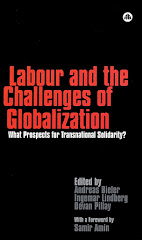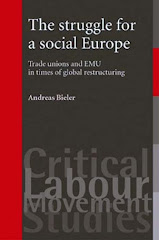In a previous
post in December 2013 (see The
Election of Matteo Renzi and the Future of Italian Trade Unions) Darragh
Golden discussed the potential for conflict between the newly elected leader of
the Partito Democratico, Matteo Renzi
and the Italian trade unions. Upon election Renzi stated that he was not
interested in immediately ousting the sitting Prime Minister, Enrico Letta;
however, that is exactly what he did and in doing so Renzi became Italy’s
youngest Prime Minister to date (and the third successive unelected leader!). There
is a danger, however, that Renzi might fall on his own sword, so to speak; as
having brought pressure to bear on his predecessor precisely because of the
slow pace of reforms, Renzi must now deliver. The expectations are high, and in
a country which is notorious for political arbitrage and exasperatingly slow,
or piecemeal, outcomes, the starkness of the challenge appears immense. As stated in the previous post, the
relationship between Renzi and the unions is ambiguous, and if the rhetorical
taunts traded between Renzi and the unions are anything to go by, it is only a
question of time before the two parties find themselves at loggerheads. In this
guest post, Darragh Golden will
assess the reform programme of Renzi and gauge the unions’ reaction thereto.
This will be done bearing in mind the broader European context.
Italy needs
swift economic reforms and Renzi has remained adamant that he is the man with
the zeal to dispatch the necessary medicine. At his first press conference as
Prime Minister Renzi outlined his reform programme which is to be implemented
in his first hundred days in office. These include devising a new electoral
law, as well as reforming the labour market, the tax system and public
administration. Nevertheless, the ominous nature of such plans placed trade
unions, especially the CGIL, on the defensive and over recent weeks, verbal
exchanges between the leadership of the CGIL and Renzi filled the pages of
left-wing diurnals.
Renzi has jumped
from the frying-pan into the fire. With little or no political experience,
apart from being the mayor of Florence, which counts for little if one
considers the political calibre of his cohorts, Renzi now finds himself at the
helm of a beleaguered Italy characterised by low growth, high debt and rising
unemployment. Renzi, however, is looking to end the austerity agenda promoted
by Brussels and Frankfurt and replace it with a Keynesian-esque policy design. The
austerity-ridden countries of Southern Europe are also hoping to stem a rising
anti-EU sentiment being expressed loudly in Italy by Grillo and his 5 Star
Movement as well as Berlusconi’s reformed Forza
Italia and the Northern League. Italy will host the presidency of the EU in
July and no doubt Renzi is hoping to wield his influence to address issues
regarding the peripheralisation of Member States within the EU. Recently, Renzi
returned from trips to Paris and Berlin where he met with Hollande and Merkel
where his reform programme was endorsed by both leaders.
 |
| Photo by Palazzochigi |
At home, Renzi needs all the friends he can get if he is to succeed in implementing the envisioned reforms contained in his programme. This will take political brinksmanship, and who’s to know perhaps the suave, dynamic and debonair Florentine can pull it off? For starters, he has evenly divvied the ministerial posts between men and women with the average age being well below 50 years old. This gender-balance approach will not go unnoticed by Italians, nor will the injection of youthfulness. On the reform of the electoral law, Renzi consulted Berlusconi and the centre-right on the new law. Known as Italicum, the law was passed by the Italian Parliament last week. However, when it comes to labour market reforms can Renzi put trade union concerns to rest or are they on a collision course?
In the context
of European austerity, Italian workers have now faced years of uncertainty,
insecurity and anxiety. Jobs losses are a daily occurrence as the unemployment
rate continues to rise and Italians begin looking beyond their national
frontiers for employment opportunities. Last week Renzi announced his so-called
‘Jobs Act’ to address rising unemployment and labour market issues. However,
none of the trade unions were consulted (much to the bemusement of some fellow
party-members). Tensions between Renzi and the union leadership wretched up
another notch when CGIL leader, Susanna Camusso, defiantly quipped that if the
new government failed to heed trade union demands on tax and labour market
reforms inevitably there would be mass mobilisations.
 |
| Photo by Gianfranco Goria |
Revealing his ‘Jobs Act’ to the nation, Renzi declared that from May 1st Italian workers earning a monthly wage less than €1,500 would receive an additional €1,000 per annum through tax cuts in their wages. The initiative would be financed through a tax increase on private financial yields in a bid to boost demand by putting more money in the pockets of workers that are already struggling to make ends meet. Naturally, the announcement went a considerable way in diffusing the tensions that had built-up between the Prime Minister and the CGIL leadership.
All three
unions, CGIL, CISL and UIL, welcomed the news. Leader of UIL, Luigi Angeletti,
described the announcement as a “turning point.” Camusso too was content and
looked positively on the initiative by noting “I see that the Prime Minister
has listened to us.” However, Camusso was also quick to point out that the
pensioners’ position should not be overlooked. Of CGIL’s 5.6 million members,
approximately 3 million of them are retirees and pensioners are excluded from
the tax cuts. Nevertheless, basic income
security is a subject close to the trade unions’ heart. As advocates of social
justice and egalitarianism, unions traditionally support the notion that a
basic income is an important component in the Decent Work Agenda promoted by
the ILO. Basic income security is seen as a social and economic right and
moving towards that end can only bode well for Renzi’s relationship with the
unions. Although, €80 extra a month does not amount to that much in real terms,
the initiative does contain significant symbolic capital and should ameliorate
relations between the unions and the government, in the short-term at least.
It would appear
that Renzi has successfully avoided confrontation with the trade unions.
Moreover, he has padded the wallets of some ten million workers by allowing
them an additional €80 per month. While Renzi might argue that the logic behind
the tax cuts is to boost consumption and thereby kick-start the flailing
Italian economy, there are at least two other reasons which come to mind as to
why the tax cuts were introduced. Before coming to those reasons, however,
there is the question of budgetary discipline, for if the numbers do not add-up
Renzi will inevitably face criticism, at best, and formal sanctions, at worst,
for breaching the guidelines set out in the Fiscal Compact. Lest he forget we
are living in an age of (imposed) austerity.
Demand led
measures by way of tax cuts will be offset by cuts in public spending and mark
a shift in the policy-making paradigm which to date has been dominated by an
austerity agenda. The Italian government remains under the watchful eye of the
European Commission and the ECB to ensure that the 3 per cent budget deficit is
not breached. Currently, it stands at 2.6 per cent but recent structural
changes announced by Renzi will alter that figure close to if not north of 3
per cent. It could well be that Renzi is no longer on a collision course with
union but instead with the ECB.
 |
| Photo by Jim D. Woodward |
Another possible logic underpinning the tax cuts is more politically oriented and has to do with the up-coming elections to the European Parliament. With one decisive action Renzi has materially improved the lives of ten million voters. Although, it is likely that a significant percentage of those are migrant workers, the rationale of basic income security, mentioned above, will not be lost on the Italian electorate. Renzi is keen to address issues that have bedevilled the European project and in particular the economic governance of the Euro. He has stated that Europe needs a new Maastricht Treaty and a strong result by the European Left in the forthcoming elections might have some success in placing such questions on the agenda. To this end Renzi is doing everything within his power, realistically that is, to shape Italy and Europe’s futures which are entwined. A good performance in the European elections will bolster Renzi’s campaign to address the architectural asymmetries of the Euro.
Sandro Mezzandra
and Toni Negri (2014) recently argued that it is erroneous ‘to mistake the
irreversibility of the integration process with the impossibility of modifying
its contents and direction.’ Could it be that Renzi is trying to break the
‘neo-liberal spell’ by redefining the European space as the locus of political
struggle? Mezzandro and Toni argue that ‘[I]f the struggle takes place at the
European level, it will definitely have the chance of striking against the
capitalistic accumulation regime … Outside of this sphere there is no such
thing as political realism.’ Certain
issues can only be addressed at the European level and Renzi, it would appear,
recognises this.
Critics might
argue that Renzi could have used the finances raised by the increase on
financial transactions to create employment. Surely ten billion euro help
create a considerable number of jobs. This would have greater benefit for the
economy as a whole. Renzi has introduced a number of other initiatives, such as
two billion euro package for refitting schools, which are of interest, but beyond
the scope of this post. Renzi’s vehemence and appetite for the challenge have
been compared to that of Berlusconi in 1994. In that regard, both have
overlooked the unions when it comes to policy output, however, when Berlusconi
unilaterally looked to overhaul the pension system the unions responded with
the largest demonstrations witnessed since the late 1960s. Renzi, however,
despite having overlooked the unions, has managed to placate them through
redistributive politics thereby averting discord.
To conclude,
what might have been a season of strikes and demonstrations has been turned
into one of relative positivism. Italy is by no means out of crisis and while
the situation with the unions, and especially the CGIL might have improved
somewhat, Renzi can expect increased scrutiny from the European Commission and
the ECB on the next spending review. It would appear that Renzi is picking his
fights wisely. By appeasing opposition parties with the reform of the electoral
system by consulting them, and similarly by neutralising a potentially
incendiary episode with the CGIL through tax cuts for low income households,
Renzi has resolved potential domestic battles. It would appear that Renzi’s
proposals are in the spirit of a former Florentine: Machiavelli. His politics
are modern yet ancient and they have an antediluvian character about them.
Renzi has been swift and emphatic in his actions and he has gone to significant
lengths to contain conflict domestically in preparation for the real fight, or
to continue the antediluvian analogy, in preparation for the big flood. The
question remains can Renzi keep Italy afloat? Can political realism deliver?
References
Sandro Mezzadra & Toni Negri “Breaking the
Neoliberal Spell: Europe as the
Battleground” available at http://www.euronomade.info/?p=1417
Darragh Golden is a Ph.D. student at
University College Dublin (UCD) and currently a member of the Transnational Labour Project
at the Centre for Advanced Study in Oslo.
His research is focused on the assessment of the positions of Italian and Irish
unions on European integration since the mid-1980s.













No comments:
Post a Comment
Comments welcome!